Advocating for Mental Health Parity
NASW Kansas Chapter joined the Mental Health Parity Committee in 2019 under the umbrella of the Kansas Mental Health Coalition. The Committee has worked for several years to address enforcement and compliance of state and federal parity statutes. Enforcement of parity statutes has been lacking across the country resulting in law suits filed with state agencies and insurance companies.
Parity Committee Meets with Insurance Commissioner
On August 21st members of the Parity Committee which includes KNASW members met with Commissioner Vicki Schmidt and staff with the Kansas Insurance Department (KID). She discussed consumer complaints addressed by KID including the Independent Medical Review (IMR) process established by the agency. She noted that 57% of complaints referred for IMR have resulted in insurance company decisions being overturned. Providers are able to initiate this process for cases involving denials of covered benefits. Most of the cases to date have involved medications and surgical procedures. The Commissioner emphasized the importance of generating complaints from mental health and addiction providers as these have been relatively scarce. This is the primary way in which KID can assist the behavioral health community in addressing claims issues for denials relating to these providers and their patients. Information about filing a complaint against an insurance company can be found at https://insurance.kansas.gov/complaint/.
Federal Parity Regulations
The final federal parity regulations have now been published. As shared by The Kennedy Forum, the newly issued parity rule is a significant step in enforcing equitable insurance coverage for evidence-based care. The U.S. Department of Labor has offered excellent overviews highlighting what the parity rules mean for different groups, including: participants, providers, and plans/insurers. If you’re unsure why parity is so important, read the ProPublica series referenced further down in this update. For a quick overview of the new rule, read this fact sheet published by the White House.
The Psychotherapy Action Network (PsiAN) offered these highlights of the new rule:
Mental Health Parity Enforcement: The new regulations ensure mental health care is treated equally to medical care. This includes network adequacy improvements and stricter guidelines on non-quantitative treatment limits (NQTLs) like prior authorization.
Increased Transparency: Health plans must now provide data to evaluate whether patients face higher restrictions for mental health services compared to medical care. This rule also prohibits plans from using discriminatory practices that unfairly limit access to mental health benefits.
Lower Out-of-Pocket Costs: By enforcing parity, the rule aims to reduce out-of-network fees and increase access to in-network mental health providers.
The rules are effective January 1, 2025, for group health plans and January 1, 2026, for individual plans.
PsiAN anticipates that these new rules and their enforcement will mean the end of “ghost networks” and the real start of insurance companies needing to make in-network participation much more viable for therapists. The hope is that we’ll see less red tape and higher reimbursements for therapists. Therapists are encouraged to inform clients know about these changes, which may reduce their costs and improve their coverage for mental health services.
Pro Publica Mental Health Series
America’s Mental Barrier: How Insurers Interfere With Mental Health Care is a series of articles from Pro Publica which can be accessed athttps://www.propublica.org/series/americas-mental-barrier. These include:
· “I Don’t Want to Die: Needing Mental Health Care, He Got Trapped in His Insurer’s Ghost Network”
· “Struggling to Find an In-Network Mental Health Provider? Here’s What You Can Do”
· “What Mental Health Care Protections Exist in Your State?”
· “Why It’s So Hard to Find a Therapist Who Takes Insurance”
Cover My Mental Health
It’s no surprise that insurance companies can raise significant obstacles to their members who need care for mental health or substance use disorders. The goal of Cover My Mental Health is to help patients and their families overcome these obstacles. Two examples from their website are informative:
Too often insurance companies raise doubts about whether or not a patient’s treatment is “medically necessary.” Insurers may deny claims or withhold authorization by asserting that the treatment is “not medically necessary.” If you’re thinking, “doesn’t the treating clinician (psychiatrist, psychologist, other medical professional) know better what’s medically necessary?”, you’re right.
Sometimes it can be difficult (or seemingly impossible) to find an in-network mental health clinician nearby and with a short wait-time for an appointment. It’s not right. When no in-network provider is available, insurers may be obligated to cover the cost of out-of-network clinicians as if they were in-network.
You can check out their resources at https://covermymentalhealth.org/.























